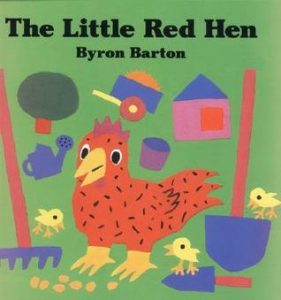Celebrate Family Literacy Month this November! Doing activities as a family is one of the most important things you can do to help your children succeed throughout their educational career and life. One vital activity is reading with your child from the time they are born even up through the middle school grades.
Talk with your child while reading to make it more fun and expand their background knowledge on different subjects. Discuss the title, author, and objects on each page (Cover- shovel, seeds, house, watering can, etc.), and ask open ended questions. For instance, in Byron Barton’s The Little Red Hen, ask open-ended questions such as: 
- “What do you think will happen?”
- “Where does this story take place?”
- “What kind of animals are in this story?”
- “What do you think she is going to make?”
- “How do you think the little red hen feels when no one helps?”
- “Is it fair that the little red hen does all of the work?”
- “What would you do in her situation?”
Questions can be altered based on the book you are reading, but ask a variety of questions about what is happening in the book to see what your child knows and can predict. Point out information you may have seen in the book later. If you’re reading a book like The Busy Little Squirrel, point out the animals and items, like acorns, that you see if you’re on a walk or riding in the car. Books have the ability to spark an entire conversation even after they’ve been read!
There are many other ways to develop literacy skills. If you’re at the grocery store, review what you are buying and why. For example, “Here are the carrots, celery, and potatoes. We’re going to cut these and put them in our vegetable soup!” Even if your child cannot answer, you are adding to their background knowledge so that if they hear or read about this topic later, they will be familiar with the information. Explore Is that Wise, Pig?, Soup Day, Duck Soup, Carrot Soup, Growing Vegetable Soup, and Ramen for Everyone to talk about different ingredients.
You can also sing songs! Singing is a great daily activity because it slows down language. Slowing language down makes it easier to hear specific sounds and syllables, breaking words apart in a way that will help your little one learn to read later. While singing, clap out the syllables, sing fast and slow, and make up alternate versions and movements to make it more fun! Check out the Super Simple Song collection on Hoopla for ideas!
Below are additional resources to help develop literacy skills:
-
Activities and Crafts
- CDC Birth to Age 5 Milestones App: https://www.cdc.gov/ncbddd/actearly/index.html , opens a new window
- Daily Early Learning Activities: https://www.daybydayoh.org, opens a new window
- Early Learning App: Vroom, opens a new window
- https://www.firstpalette.com, opens a new window
-
https://www.lakeshorelearning.com/resources, opens a new window
- Literacy Resources


Add a comment to: Learn and Read Together During Family Literacy Month